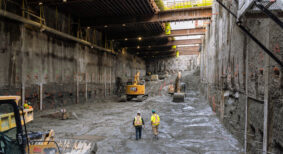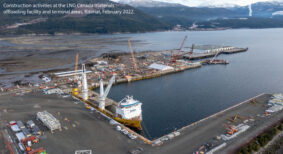The B.C. NDP government has introduced a new labour agreement for major public-sector infrastructure projects, which will prioritize hiring and training for Indigenous people, women and locals.
Under government’s new Community Benefits Agreement, a diverse and qualified workforce will be supplied for select major public infrastructure projects through a newly created Crown corporation, BC Infrastructure Benefits Inc. (BCIB). BCIB will hire the project’s construction workers, and will work with unions and contractors to dispatch labour, as well as manage payroll and benefits. The organization is expected to be fully operational in fall 2018.
“With this agreement, we’re not just investing in roads, bridges and other infrastructure, we’re investing in good jobs and new opportunities for people who live in B.C. And with our focus on expanding apprenticeships for young British Columbians, we’re helping build B.C.’s next generation of construction workers,” said Premier John Horgan.
Highlights of the agreement include:
- A targeted approach to maximizing apprenticeship opportunities on major public-infrastructure projects.
- Focus on priority hiring and training of Indigenous peoples, and women.
- Co-ordinated access to existing training programs, while identifying and addressing skills gaps.
- Priority hiring for qualified individuals who live within close proximity of the projects.
- Hiring flexibility for contractors, who can request named hires.
- Wage alignment to prevailing industry rates to promote good wages for all employees.
The first projects to be delivered under the new community benefits framework are the new Pattullo Bridge, and the four-laning projects on the Trans-Canada Highway between Kamloops and Alberta. The request for qualifications (RFQ) for the Pattullo Bridge Replacement Project has been released.
“Certain sectors of our province have been ignored for far too long. Under a Community Benefits Agreement, these groups will have opportunities to contribute and invest in their communities while essentially building B.C,” said Tom Sigurdson, executive director of the B.C. Building Trades (BCBT)
Sigurdson calls B.C.’s new construction model a progressive and forward-thinking roadmap that will ensure B.C. remains prosperous.
The announcement also drew criticism and concern from other construction associations. Chris Gardner, president of the Independent Contractors and Businesses Association, called the new labour agreement “a payoff for political favours.”
“With nearly $30 billion in government construction projects planned over the next three years, project delays and overpaying by creating a union monopoly will cost taxpayers billions of dollars,” said Gardner. “Fair, transparent and open bidding should be a cornerstone value in a democracy like B.C. Whether you are union or open shop, you should have a fair shot at work put out by government.”
According to the Progressive Contractors Association of Canada (PCA), the agreement raises serious concerns about value for tax dollars and fairness for the vast majority of B.C. construction companies and their workers
Though details are scarce, indications are these projects will be modeled after the 1990s Island Highway Project, which was millions of dollars over budget. Workers who wanted to build that project were forced to pay dues to the building trades unions (BTU) . Today, building trades workers constitute just 15 per cent of B.C.’s construction workforce.
“Allowing the building trades unions a monopoly over future public construction projects by forcing all workers to pay union dues is not in the public interest,” said Rieghardt van Enter, PCA Regional Director, B.C. “This will inflate construction costs and limit opportunity for the vast majority of skilled workers who chose not to belong to the BTUs. A restrictive deal like this would be more like a ‘Building Trades Benefits’ than Community Benefits Agreement.”
The Vancouver Regional Construction Association (VRCA) and the British Columbia Construction Association (BCCA) also expressed concerns, noting Community Benefit Agreements are seen by various levels of government as a way to solve social issues, however, they represent a potentially limiting approach that may layer on costs and reduce competitive bidding on provincial infrastructure projects.
VRCA and BCCA are non-partisan construction associations representing both union and open-shop employers. The two have always advocated for fair, open, and transparent procurement processes which are an obligation and responsibility of government to taxpayers.
VRCA and BCCA therefore strongly oppose any procurement practice or program that seeks to confer exclusive bidding rights to firms based upon any system of quotas or legislated wages within the province.









